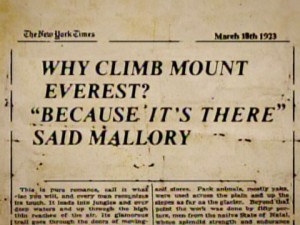Everyone wants to leave an impression on the world. The human lifespan is woefully too short and we all worry that someday we’ll be gone and forgotten. It’s because of this that we spend so much time trying to leave a legacy and try to find ways to make ourselves memorable. We want to be the life of the party, we want to change the hearts and minds of others, we want someone to realize we were here. Deep down, that’s one of the greatest driving forces of human civilization. We will always work to be more comfortable, but we’ll work harder to make sure the next generation remembers us.
I think that’s why it gets so hard for us to reel ourselves back when it comes to our opinions. It has become a common accusation that the modern generation is self-absorbed but that’s assuming there was ever a time where a civilization wasn’t. We may tweet about our day to day lives, but previous generations carved faces into mountains and constructed monuments to their own ego. Say what you will about our need to self-promote, it’s not a new aspect of human nature – just easier today.
So it comes as no surprise that a recent trend in fiction, especially speculative fiction, is that people may overwhelm their story with their message. I talked about this once before, some time ago, and dealt with the idea of being humble. But in the course of talking about humility I left out something else that needed to be addressed. Unfortunately, people can sometimes be humble but still manage to overwhelm their message. The reason for this?
Sometimes people aren’t being arrogant, sometimes people are just worried they’ll be misunderstood.
Letting Go To Interpretation
You have a message in mind. You know what you want to inspire in people. But you know, especially if you’ve gone through a comparative literature course, that people are going to interpret your work however they please. The chances of being misunderstood down the line and having your work turned another direction are clear and present. Is it any wonder you would be concerned that something precious to you may be flipped on its head?
It’s this kind of thinking that has become a driving force in recent trends in fiction, particularly speculative fiction. Not long ago, during the horrendous debates around the Hugo Awards, an entire group rose up and started telling us all to become shallow. People hated this and hated how they did it. Of course science fiction and fantasy are places to challenge big ideas. That’s our bread and butter, that’s what gets us up in the morning. We want to envision a better world and put examples of how that could happen in front of each other.
So it is some surprise to many that a lot of people opposed to the “Sad Puppies” echoed the sentiment that recent speculative fiction has become hard to read. They hated what the Sad Puppies were saying, but they agreed there was a problem. This contradiction is hard to understand for many, but it still existed. And the reason for this contradiction was something I worried about in the past. It wasn’t the message that these people were losing interest in, it was how that message was being presented to them.
In fear of misinterpretation, a lot of recent speculative fiction has left no room for interpretation and has put their message central to every aspect of the story. This definitely ensures that your message gets across, but it also makes it difficult for most readers to get through. There are some who will be eager to read it specifically for the message, but others are looking for a story and finding that part is sometimes lacking in today’s market. As someone who thinks our genre is the place for big ideas, I don’t want to see that happen. So I present to you a couple ways to have your message and make it interesting at the same time, starting with…
Accepting The Alternate Possibilities
One of the problems faced by people who end up putting their message ahead of their story unintentionally is the idea that someone could come away with the wrong idea. There’s a sense that being explicit will somehow guide people towards agreeing with what’s being said. In theory, this could be true, but in practice it rarely is. The fact of the matter is, if you’ve written a good story, even if it’s one full of messages, there’s going to be someone who sees it the opposite way.
Don’t worry, this doesn’t just happen to beginning writers or people in the modern day. Ray Bradbury, one of the greatest speculative fiction authors in the last century, actually has a regular dispute with people about the meaning of one of his best known novels: Fahrenheit 451. Ray had intended for a message regarding the nature of television and how he believed it would lead to the downfall of critical thinking and literature. Most people, on the other hand, interpreted it as being a message about censorship and the use of book burning as a means of controlling the flow of information. Clearly, these two things don’t jive and Ray has never been able to convince people otherwise. In fact, on at least one occasion he walked out of a presentation when the people he was speaking to insisted that he was wrong about his own book.
The thing is, if that’s what people are going to get out of what you’ve written, there’s not much you can really do about that. We often times try to control things like this to such a degree that we forget it’s not something we can control. So there’s really only one thing you can do: stop worrying about what you want them to hear and be prepared for them to hear something different. Usually you’ll find you inspire ideas that you didn’t even realize were there. Like Bradbury, you can inspire great things without even fully intending them. Unlike Bradbury, you should be willing to let those ideas grow on their own.
Allow Yourself A Chance To Relax
Of course, that also means you need to relax a bit. A great part of what can draw people in or push them away is the energy around your story. If you’re too stiff and concerned with how they’re going to interpret your work, then you’re probably going to make that story stiff and worried sounding as well. This is going to cause it to be harder to enjoy, harder to appreciate, and even harder to read.
So let yourself relax and allow yourself to be caught up in the story itself. Maybe that would risk the possibility your message gets lost, but if it’s on your mind at all it will be in your work. It’s important for writers to feel an emotional attachment of some sort to their work and not a purely clinical one. It’s important for you to laugh at the things that you think are funny, get sad about hurting one of your characters, or take a moment to appreciate the beauty of the sights you’ve imagined. Each of these is a small detour away from staying on message, but they’re important detours and they’ll make it possible for you to invoke those feelings in others as well.
Something to remember is that opening yourself up on the page will mean that a lot of your ideas are going to get there even when you don’t mean for them to. It is literally impossible for you not to slip a little of yourself into what you write. Even if you try as hard as possible not to do it, it will get through in the effort you made to avoid it. Even now, you’re probably getting an idea of who I am by stray details, even if that picture is far from complete.
Result? Your message is going to be there even if you aren’t concerned about it. It’s a natural part of you, and the only thing you should really worry about is making sure you’ve written a good story. Which means you should try to remember…
Themes Are Rarely Stories
It’s a common problem today that people tend to build stories around the novelty of their concept. You build a world and you start to become concerned about making the story about that world. But often you come to a point where the world, which should be fantastic, becomes aggravating because it’s impersonal. You’ve focused so much attention on the big picture that the small moments are almost non-existent. And becoming impersonal is one of those things that makes what should be an enjoyable experience a challenge instead.
Stories are almost never about ideas. Stories are about people. Ideas, themes, are always present in what you create. Even if you don’t mean for them to be there, they’ll exist. But you have to make sure that there’s a story in there that comes before the big ideas. These stories will make the ideas more accessible, more interesting, and easier to digest. It’s one thing to tell of a world where the government is watching your every move, but while that’s what we remember of Orwell’s 1984 it’s worth noting that the story of 1984 was about what happened when that world came down on individuals. It wasn’t the world itself that took center stage in that story, it was about the people living in it.
So don’t try to force your theme to be the story. Try to find the personal angle to it and continue down that road. If what you want to talk about ends up being something that would directly impact your characters, that impact will be your story. Remember that and make an effort to keep everything that happens part of a greater narrative within the protagonist’s life, rather than making your protagonist a simple observer.
Trust Your Metaphors
And finally, there are a lot of times when we set up a metaphor for the thing we’re passionate about in the real world. This is particularly true of speculative fiction where it’s not unheard of to use a science fiction or fantasy element to stand in for any number of pressing issues in today’s society. Klingons were a clear metaphor for cold war fears, Romulans too, but both of them were used to represent the bogeyman while Chekov sat there on the bridge to show that it was possible for us to get over those fears.
But what happens often when people get nervous is they start to ham-fist these metaphors and make sure that you know exactly what they’re meant to be. Often times these metaphors are obvious enough on their own, but the writer behind them will get nervous or overzealous and begin to try to reinforce them as much as possible. At first, people think it would be cute, interesting, or insightful. However, as you continue to reinforce and amplify your metaphor, they become a burden.
The solution to this is simple, like with earlier sections here – relax. Trust your metaphors, let them do what they’re going to do and trust that people are smart enough to understand them. It’s not hard to figure out what some of these things are when you’ve gone through a whole story about them. It was clear back in the 1960s and 70s that the X-Men were representing a lot of contemporary social issues. Professor X mirrored a lot of ideals that you could see in the likes of MLK while Magneto spoke of more militant beliefs that were common in the day as well. These didn’t have to be blatant for us, though sometimes they were, and they were allowed to stand on their own. In fact, because they were allowed to stand on their own, the metaphor changed slightly over time and today…
You find that those same old metaphors nicely reflect today’s movements as well.
(I write novels. These are things I’ve had to remind myself of a couple times in the past, and if I ever slip on them, feel free to yell at me on Twitter. In the meantime, good luck with your writing.)


















Of course there are authors, like me, who grew up in an age where we relished ambiguity. I once read an interview with Joyce where the interviewer asked him if by a certain passage he meant … (I’ve long ago forgotten the specifics). Joyce said, “absolutely” when it was clear he never intended that at all. It is okay to read multiple meanings into a work. It is not okay to read the opposite of what the author intended.
As writers we have to allow readers room to find meaning beyond what we may have seen in our own words. As readers we are obligated not to put words into the author’s text and recognize that while there is room for interpretation, there is no room for misinterpretation either. Stranger in a Strange Land was not advocating Imperialist domination by the West and the Love Song of J Alfred Prufrock was not about a guy who could have his way with women any time any place.